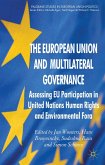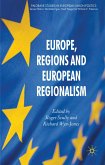Examines the European Union's relationship with the United Nations and analyzes the EU's contribution to 'effective multilateralism'. This book shows that the EU most often fails to make the UN as effective as it should be in addressing global challenges, failing to lead within the UN, and yet develops itself as a credible and reliable partner.
This is the first book to examine in-depth the EU's relationship with the UN and to analyze critically the EU's contribution to 'effective multilateralism'. The contributors show that the EU most often fails to make the UN as effective as it should be in addressing global challenges.
Hinweis: Dieser Artikel kann nur an eine deutsche Lieferadresse ausgeliefert werden.
This is the first book to examine in-depth the EU's relationship with the UN and to analyze critically the EU's contribution to 'effective multilateralism'. The contributors show that the EU most often fails to make the UN as effective as it should be in addressing global challenges.
Hinweis: Dieser Artikel kann nur an eine deutsche Lieferadresse ausgeliefert werden.
'Omnipresent grumbling about the UN encounters growing dissatisfaction about the EU. This invaluable collection provides a helpful counterweight with both insights and concrete examples illustrating when multilateralism matters to contemporary challenges of globalization and insecurity.' - Thomas G. Weiss, Presidential Professor, The CUNY Graduate Center, and Director, Ralph Bunche Institute for International Studies, USA
'The editors have elegantly integrated the contributions of several well-known experts on the European Union and the United Nations into a seamless and clearly written examination of a key issue in international relations. Contributors to Intersecting Multilateralisms expertly - and candidly - assess what this means for European governments, for the EU as a global actor and for the UN. While their conclusions are not uniformly flattering, either to the EU or the UN, they are highly informative...the broadest and deepest analysis of the European Union in the United Nations available in the literature of international relations.' - Donald J. Puchala, Byrnes Professor of International Studies, University of South Carolina, USA
'a very significant contribution to an important debate.' - European Foreign Affairs Review
'Thus, the broad, in-depth and competent analysis on the "intersections" between "the world's most successful case of multilateralism", the EU, and the most universal of all multilateral institutions, the UN, offered by this book - the most recent and comprehensive collection of essays by prominent European scholars on the issue - appears highly provocative.' - The International Spectator
'This book should be acclaimed by all scholars working on either the UN or the EU (or both)...' - Gilles Bertrand, David Michael Green, EUSA Review (European Union Studies Association)
'The editors have elegantly integrated the contributions of several well-known experts on the European Union and the United Nations into a seamless and clearly written examination of a key issue in international relations. Contributors to Intersecting Multilateralisms expertly - and candidly - assess what this means for European governments, for the EU as a global actor and for the UN. While their conclusions are not uniformly flattering, either to the EU or the UN, they are highly informative...the broadest and deepest analysis of the European Union in the United Nations available in the literature of international relations.' - Donald J. Puchala, Byrnes Professor of International Studies, University of South Carolina, USA
'a very significant contribution to an important debate.' - European Foreign Affairs Review
'Thus, the broad, in-depth and competent analysis on the "intersections" between "the world's most successful case of multilateralism", the EU, and the most universal of all multilateral institutions, the UN, offered by this book - the most recent and comprehensive collection of essays by prominent European scholars on the issue - appears highly provocative.' - The International Spectator
'This book should be acclaimed by all scholars working on either the UN or the EU (or both)...' - Gilles Bertrand, David Michael Green, EUSA Review (European Union Studies Association)








